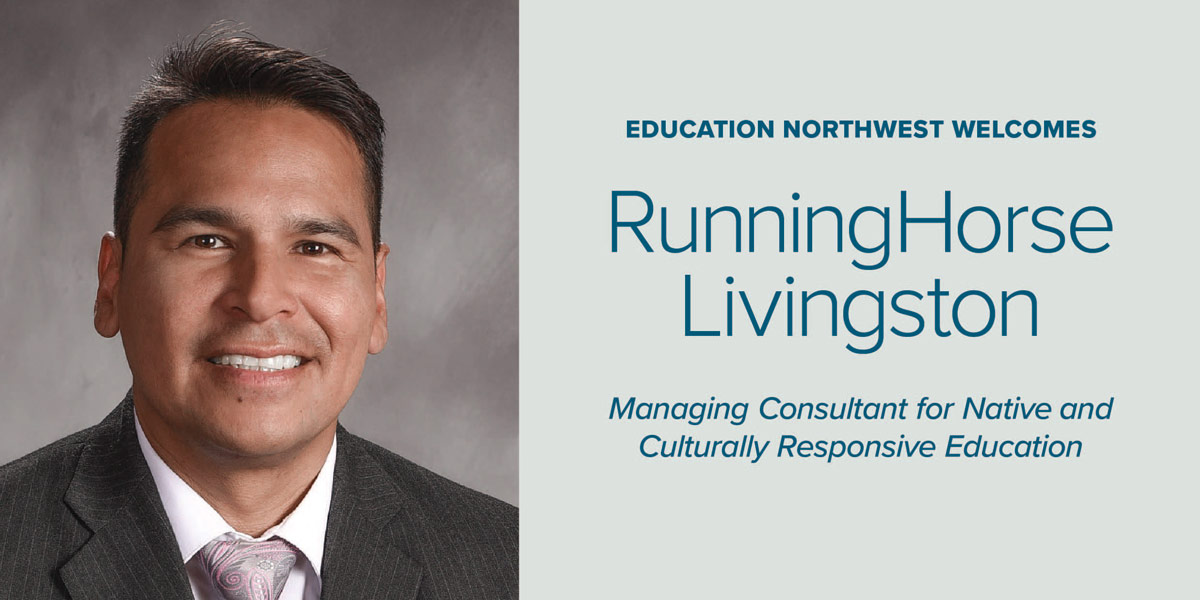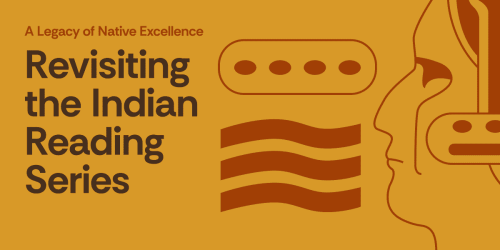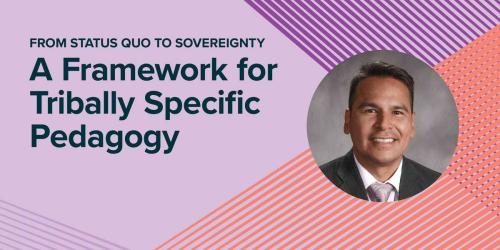Mathematics Instruction Expert RunningHorse Livingston Joins Education Northwest

For nearly two decades, RunningHorse Livingston has coached educators in mathematics and culturally responsive instruction. “Mathematics is problem solving,” he says. “It’s what you do when you don’t know what to do. That resonates with me, because it’s a life skill. If we can increase this life skill that has impacts down the road.”
One of the impacts RunningHorse hopes to have through this work, he says, is to increase opportunities for young people in communities like the one he grew up in—the Anishinaabe Community on the Bad River Reservation in northern Wisconsin. “When I go home,” he says, “I don’t see faces that look like mine in our CFO or CEO roles. I don’t see directors or doctors that look like me.” Indigenous youth often don’t pursue those roles, RunningHorse says, because they struggle in math and science. “That struck a nerve for me as an educator,” he says, “because the whole goal of education is really to help kids become productive adults and take the lead in our country.”
Creating Engaging Contexts for Learning Math
One important key to engaging students in math, RunningHorse says, is connecting it to real life. “It’s hard to make a math textbook fun if you’re just doing computation,” he says. “What we’re learning in math education is that if we can provide an experience rather than a lesson and pull the math from the experience, that’s a more organic way of learning concepts.”
If we don’t figure out a way to serve those students effectively, we’ll see the same kinds of struggles and gaps that we’ve seen for the past twenty or thirty years.
—RunningHorse Livingston
When RunningHorse is in northern Minnesota working with educators, he talks about snowmobiles. When he’s in Seminole country in Florida, he talks about the Everglades. “The math standards are the same,” he says, “but in contexts that are relevant and engaging for kids.”
RunningHorse didn’t dream of being an instructional coach for mathematics as a child. “It’s not something you set out to do when you’re a kid,” he jokes. In college, he studied architecture. In the summers, though, he worked as a counselor at the same American Indian Science & Engineering Society summer camp he had attended as an eighth-grader. He found the experience of working with Indigenous youth at the camp so rewarding that he decided to pursue a master’s degree in education. He wanted to share his interest science and math with more young people. “Why is math in school so different from math in real-life experiences?” he wondered. “I think I’ve been trying to make that connection for the last 17 years, professionally.”
A National Conversation
In October 2023, RunningHorse and colleague Mandy Smoker Broaddus attended the annual conference of the National Indian Education Association in Albuquerque. At the conference, RunningHorse noted two themes that connect to the work he hopes to do as a member of Education Northwest’s staff: grow-your-own educator programs and pre-service teacher education.
“Tribes and organizations are trying to develop the teacher workforce through education, and specifically building cohorts within communities that then serve as educators in those communities,” RunningHorse says. This is one way to address the issue of Indigenous youth and others from marginalized backgrounds not seeing educators and leaders who share their own backgrounds.
“When you’re an Indigenous student, seeing another Indigenous person in that kind of role, it makes a difference,” RunningHorse says. “It’s not necessarily the answer to everything, but I think there’s a certain level of understanding that comes with being part of a community that you grow up in.” That community might be based on ethnicity, geography, or something else, he notes.
Pre-service instruction, RunningHorse says, often focuses more on the content—what you teach—than on pedagogy, especially for secondary school math teachers. “Your ability to know your audience as a high school teacher is tough, because you’re learning that part on the fly.” He adds that the focus on content, in any area, often overshadows delivery—resulting in student disengagement.
Conference presenters and attendees, RunningHorse says, discussed whether colleges and universities are providing the type of quality education teachers need to become effective practitioners in the classroom. “I think there are a lot of goals around that, especially in culturally responsive education and, I would say, in rural communities,” he says. “If we don’t figure out a way to serve those students effectively, we’ll see the same kinds of struggles and gaps that we’ve seen for the past twenty or thirty years.”
Joining the Education Northwest Team
Mandy looks forward to working with RunningHorse to continue and enhance Education Northwest’s work in the field. “RunningHorse brings a perspective and approach to education that centers Tribal communities,” she says. “He has worked with hundreds of educators around the country to understand how to do that same thing in their own instructional practice, so that the values of a Tribe and community are applied in pedagogy. His hands-on, collaborative approach helps educators see their role in advancing the learning lives of Indigenous students in new and innovative ways.”
Having spent almost two decades traveling the country as an instructional coach, RunningHorse says he’s eager to expand his reach as a member of Education Northwest’s Native Education team. He hopes to help the organization become a leader in teacher development and professional development for teachers on pedagogy—with a culturally responsive approach.
Tribes and other communities, he says, want to develop their own teaching standards that govern the kind of instruction their children receive. “There are tons of best practices out there,” he says. “There’s tons of evidence-based instruction. But what are the best things for this particular community? That, to me, is pretty exciting.”



